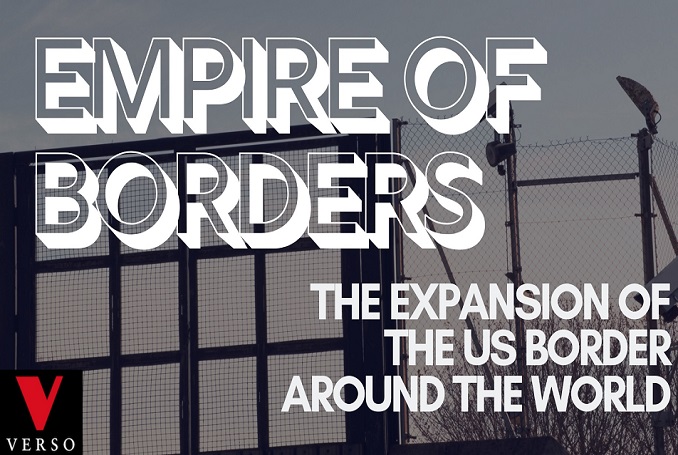
By Jim Miles
(Empire of Borders – The Expansion of the US Border around the World. Todd Miller. Verso, New York/London, 2019.)
Todd Miller’s new work, Empire of Borders – The Expansion of the US Border around the World, discusses how the modern frontier – modern boundaries – are moveable while allowing mobility for some, and essentially imprisonment, subjugation, and containment for others. Recently I reviewed Greg Grandin’s excellent book, The End of the Myth: From the Frontier to the Border Wall in the Mind of America (Metropolitan Books, 2019). In that book, Grandin examines how the U.S. creates a myth around the empire’s historical expanding frontier compared to its underlying reality. Todd Miller takes that theme and extends it around the world in terms of the empire’s need for “security” and all the implications rising from that simple term for today’s contemporary world.
What Is It All about?
The big question is, what is it really about? It resolves down to money and power for the empire over the people of the world, a “spectacular inequality [is] a glimpse into the heart of unsustainable planet, where the top 1 percent have more money than the entire bottom half of humanity. It is what this world of borders [is] really about.” The many arbitrary borders around the world, a large percentage determined by rapacious colonialism, is “rarely…discussed in terms of the human rights violation it represents, the artificial separation and division of people -of families – and the death and suffering it causes….a military and economic apparatus that ensure[s] the dominance of the few over the many.”
Ultimately it comes down to imperial control, a “securicratic war: “Our goal is not combating a rival but maintaining our imperial position and maintaining imperial order.” Miller’s introduction sets the tone as “borders were, in a sense, being fortified against the poor, and made porous or simply erased for the wealthy and powerful.” Reflecting on Thomas Friedman’s truism about the hidden fist of the military keeping the world safe for Silicon Valley, Miller writes about a “world whose battlefields are at the edges of where the rich and powerful meet the poor and marginalized, who must be managed, confined, and pacified.” Except that the hidden fist is no longer hidden, but very much in your face.
Common Themes
Various themes course through Miller’s contemporary look at the surveillance borders.
The most significant one is that borders are mobile – they move quite literally with the military apparatus used to patrol them as well as the many roaming roadblocks, checkpoints, searches on the ground as well as drones, dirigibles, and spy planes from above. The frontier has not ended, is not settled, but is highly mobile creating open space for some, and contained space for others.
Many other ideas enter the discussion. The problems of indigenous people and the meaning of “civilization” carries throughout the work. This obviously extends into colonialism, racism, human rights, private property versus the commons, neoliberalism as an economic model, climate change and associated problems with war and refugees/migrants as well as economic migrants as discussed with NAFTA. The International Monetary Fund and its “structural adjustment programs” with its demands for privatization enters the discussion with Mexico, Latin America and most of Africa. “Free trade” fits into the whole idea of money and power, essentially being a neoliberal slogan permitting corporations and big money to move around while restricting the movement of people – indigenous or otherwise – and destroying their previously successful agricultural, cultural, and economic societies.
But the big idea, the global empire of moveable boundaries lies on the Mexican-Palestinian border. Yes, go look at a map – geographically these two boundary areas are about as far apart as they can be, but the underlying similarities are all too real, all too powerful, and all too deadly.
Israel
At the center of it all, unsurprisingly, is Israel, which has the largest cluster of tech companies in the world operating to create more and more items for security. Miller cites Jeff Halper,who says, “Wars aren’t wars anymore: they are operations….Israel is selling more than weapons. It is selling a security state.”
It is a “twenty-first century breed of was, hidden behind the word “Security.” Qalandiya, one of many security ports in the Israeli wall is examined where its “operations” present a “process as a multifaceted and ritualistic act of submission before the soldiers and the cameras.” As for the open air prison of Gaza, an Israeli security official speaking at one of many security conferences Miller attended said, “We have learned a lot from Gaza. It’s a great laboratory,” the latter term apparently “part of the common parlance,” used as a reference as well for the Mexico border. Another security sales rep said, “We build it [the surveillance system] in a live situation.” This was not just a war, it was a laboratory.”
Israel is an equal opportunity opportunist, trading with many countries around the world, extending the boundaries of empire and helping not so sovereign state governments restrain and contain the local populations, the indigenous people of the world, while allowing the corporations and financeers to harvest the riches of the world for the powerful few. It comes home to roost within the U.S. as the internal mechanisms of control are reflections of what is applied at the theoretical boundary. Not only are boundaries of empire attempting to move farther and farther away from the heartland boundary to the periphery of subjugation, the techniques are also being used internally to control any disturbing elements that might object to government and corporate policies in the homeland.
Miller’s writing is readily accessible, using a mix of first hand experience creating a strong anecdotal reporting style, combined with an obviously strong research base for other perspectives and additional information. It should be included in any discussion of borders and boundaries, of immigrants, migrants, and refugees, and any discussion of our neoliberal socio-economic paradigm that attempts to control the world through its mobile Empire of Borders.
– Jim Miles is a Canadian educator and a regular contributor/columnist of opinion pieces and book reviews to Palestine Chronicles. His interest in this topic stems originally from an environmental perspective, which encompasses the militarization and economic subjugation of the global community and its commodification by corporate governance and by the American government.

– Jim Miles is a Canadian educator and a regular contributor/columnist of opinion pieces and book reviews to Palestine Chronicles. His interest in this topic stems originally from an environmental perspective, which encompasses the militarization and economic subjugation of the global community and its commodification by corporate governance and by the American government.




